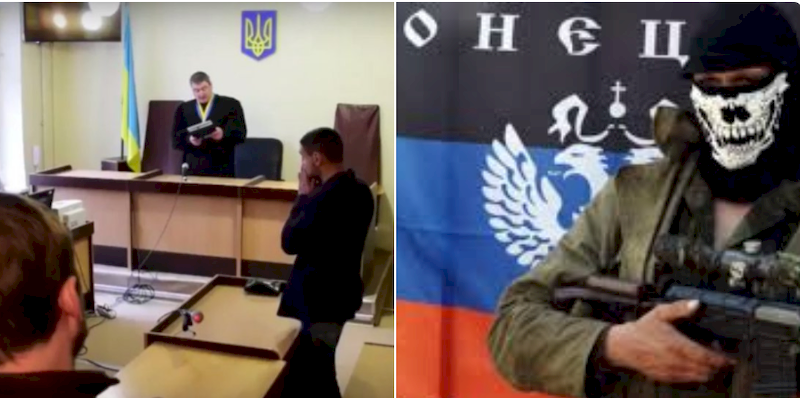Judges terrorized into passing 12 times less sentences on Russia-backed separatists than on Ukrainian soldiers

‘Separatists’ and Russian soldiers who commit crimes in the Donbas military zone get much lighter sentences than Ukrainian soldiers, and this has nothing to do with any difference in the gravity of their crimes. A prominent specialist in criminal law warns that the Ukrainian authorities are failing to ensure that justice is served in Donbas, despite apparently obvious solutions to some of the main problems.
The statistics revealed by Professor Mykola Khavronyuk are certainly disturbing. In 2015, 2,500 Ukrainian soldiers were convicted of violations of Ukrainian legislation on military service. This is in stark contrast to the 210 people convicted of crimes linked with separatism, terrorism or other activities of the self-proclaimed ‘Donetsk and Luhansk people’s republics’ [DPR, LPR].
The judges now working in Donbas are partly intimidated, partly blackmailed. The number of both courts and judges has fallen significantly, and those who remain are often influenced by relatives remaining in areas under the pro-Russian militant control. The judges often pass sentences which are lighter than warranted out of fear both for themselves, and for their relatives. “This cannot be called independent and objective justice”, Khavronyuk says, adding that such rulings are much less just than in other parts of Ukraine. This will mean that after what he terms de-occupation, a huge number of investigators will be needed to probe crimes committed on the territory in question.
It is not only justice in the trials of those supporting the so-called ‘republics’ that is being compromised. In endorsing the call to hold trials away from Donbas, Oleksandr Pavlichenko from the Ukrainian Helsinki Human Rights Union cited the example of a driver, charged over an accident which killed 12 men, and injured 21 soldiers. The immense pressure placed on the courts prompted the decision to transfer the trial from Kramatorsk to Kyiv, with this significantly improving the chances of fair and objective court proceedings.
Pavlichenko recalls cases where people linked with volunteer battalions have literally seized court premises, demanding that the judges pass the ruling they wanted. He knows of cases where the local authorities have become involved in putting pressure on the courts. On one occasion, the heating in the courtroom was switched off, and the security guards removed.
Some judges openly state that they have a conflict of interests because of family in areas under militant control and therefore withdraw themselves from a case. This has led to a huge backlog, especially since many cases need to be heard by a panel of three judges. If just one withdraws him or herself, the court hearings cannot continue.
Khavronyuk is generally very critical of Ukraine’s law enforcement bodies for failing to carry out justice as needed. He notes that the military prosecutor’s office, which was reinstated in 2014, is mainly concentrating on corruption crimes.
“They are for some reasons not taking on the investigation of the 1200 crimes about which the International Criminal Court recently reminded Ukraine”. he adds.
The criticism expressed by Khavronyuk and human rights groups has been reiterated by the Office of the United Nations High Commissioner for Human Rights (OHCHR). In its latest, 20th, report, it states that “Accountability for grave human rights violations in conflict-related cases remained elusive. Legal proceedings were plagued by ineffective investigations, politicization of cases with the involvement of high level officials and infringements on the independence of the judiciary. OHCHR documented substantial pressure exerted on judges in numerous cases”.
The accounts already given by some of the 73 soldiers and civilian hostages recently freed from DPR / LPR captivity have only confirmed the doubts about the ‘legal remedies’ provided by the Kremlin-backed ‘republics’. The massive ‘sentences’ passed on blogger Edward Nedelyaev, religious scholar Ihor Kozlovskyy and many others for expressing their pro-Ukrainian position were evidently political, but there are also other sentences for real crimes which must also arouse concern.
OHCHR notes, for example, that “within structures in territory controlled by armed groups, arbitrary detentions and ‘prosecutions’ were compounded by the lack of recourse to effective remedy. This is of particular concern given the ‘pronouncement’ of a second ‘death penalty’ by the ‘supreme court’ of the ‘Donetsk people’s republic’ in November.”
As reported earlier, although Ukraine is only due to ratify the Rome Statute of the International Criminal Court [ICC] in 2019, it has recognized the Court’s jurisdiction to prosecute crimes against humanity and war crimes committed on the territory of Ukraine from February 20, 2014.
While the Office of the ICC Prosecutor has already established that Russia’s invasion and occupation of Crimea constitute an international armed conflict, Russia’s major involvement in the conflict in Donbas turning this into “an armed conflict of an international nature” remains at the stage of investigation.
It is both for this reason, and because of the clear need to ensure justice for the future reintegration of Ukraine, that Ukraine’s law enforcement agencies need to be investigating all killings, abductions, disappearances, cases of torture and ill-treatment and other crimes committed in Donbas. It should be stressed that this is regardless of which side is believed to have been involved, however civic organizations can also help the law enforcement bodies in gathering hard evidence of Russia’s control over the so-called ‘republics’, its direct military involvement, as well as its critical role in funding and arming the militants.





